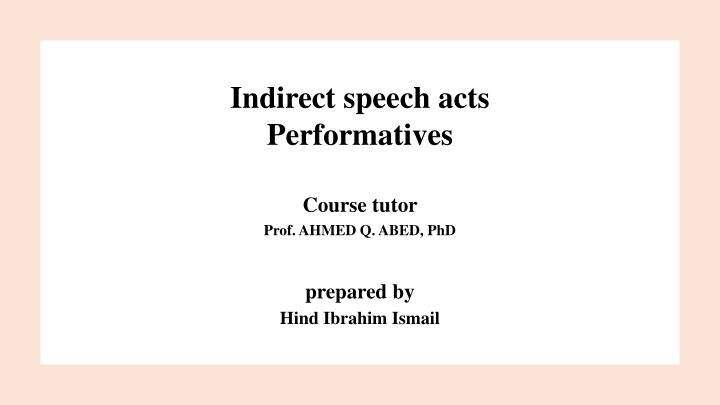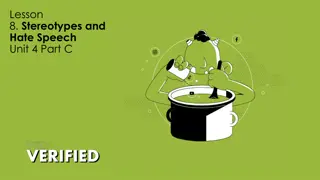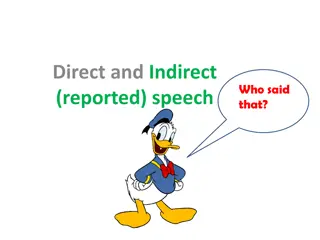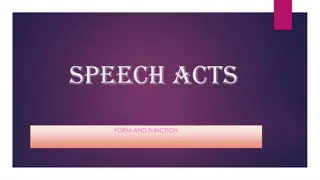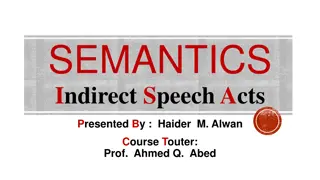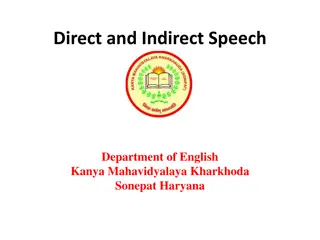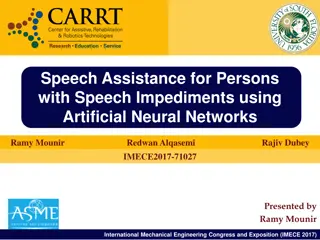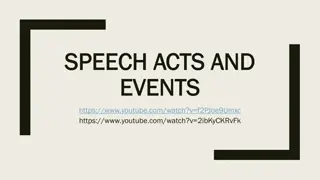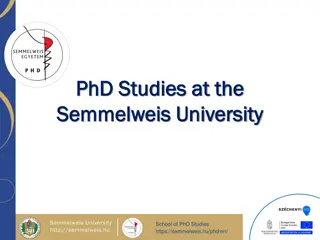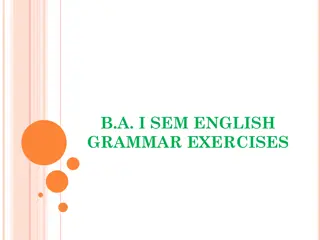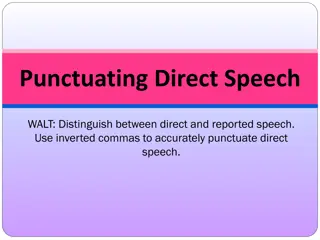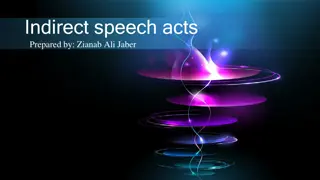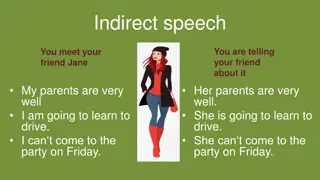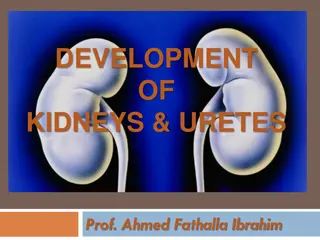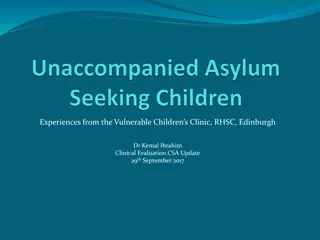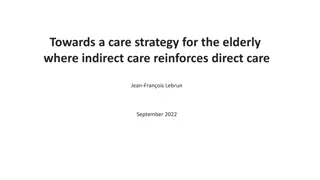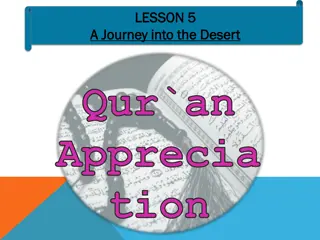Indirect Speech Acts Performatives Course Tutor Prof. Ahmed Q. Abed, PhD by Hind Ibrahim Ismail
Deborah Tannen's experience in Greece illustrates how indirect speech acts can convey unintended meanings. Performatives, as discussed by J.L. Austin, are declarative sentences that do not simply describe but actively change reality. Understanding sentence meaning requires considering not just truth but also action and intention.
Download Presentation

Please find below an Image/Link to download the presentation.
The content on the website is provided AS IS for your information and personal use only. It may not be sold, licensed, or shared on other websites without obtaining consent from the author.If you encounter any issues during the download, it is possible that the publisher has removed the file from their server.
You are allowed to download the files provided on this website for personal or commercial use, subject to the condition that they are used lawfully. All files are the property of their respective owners.
The content on the website is provided AS IS for your information and personal use only. It may not be sold, licensed, or shared on other websites without obtaining consent from the author.
E N D
Presentation Transcript
Indirect speech acts Performatives Course tutor Prof. AHMED Q. ABED, PhD prepared by Hind Ibrahim Ismail
Introduction Deborah Tannen (1981) recounts the following experience as a visitor to Greece: While I was staying with a family on the island of Crete, no matter how early I awoke, my hostess managed to have a plate of scrambled eggs waiting on the table for me by the time I was up and dressed; and at dinner every evening, dessert included a pile of purple seeded grapes. Now I don t happen to like seeded grapes or eggs scrambled, but I had to eat them both because they had been set out at great inconvenience to my hosts especially for me. It turned out that I was getting eggs scrambled because I had asked, while watching my hostess in the kitchen, whether she ever prepared eggs by beating them, and I was getting grapes out of season because I had asked at dinner one evening how come I hadn t seen grapes since I had arrived in Greece. My hosts had taken these careless questions as hints that is, indirect expressions of my desires. In fact, I had not intended to hint anything, but had merely been trying to be friendly, to make conversation.
Performatives The definition of sentence meaning is (1) To know the meaning of a [declarative] sentence is to know what the world would have to be like for the sentence to be true. Perhaps you wondered, gentle reader, how we might define the meaning of a non-declarative sentence, such as a question or a command? It must be possible for someone to know the meaning of a question without knowing what the world would have to be like for the question to be true. Aquestion is not the sort of thing which can be true, but clearly this does not mean that questions are meaningless. The semantic analysis of questions and commands is an interesting and challenging area of research. Even if we restrict our attention to declarative sentences, however, we find some for which the definition in first line does not seem to be directly applicable.
J.L. Austin called attention to a class of declarative sentences which cannot be assigned a truth value, because they do not make any claim about the state of the world. Austin s examples: (2) a. I do (sc. take this woman to be my lawful wedded wife) as uttered in the course of the marriage ceremony. b. I name this ship the Queen Elizabeth as uttered when smashing the bottle against the stem. c. I bet you sixpence it will rain tomorrow. Further examples: (3) a. I hereby sentence you to 10 years in prison. b. I now pronounce you man and wife. c. I declare this meeting adjourned. d. By virtue of the authority vested in me by the State of XX, and through the Board of Governors of the University of XX, I do hereby confer upon each of you the degree for which you have qualified, with all the rights, privileges and responsibilities appertaining.
Austin pointed out that when someone says I now pronounce you man and wife or I hereby declare this meeting adjourned, the speaker is not describing something, but doing something. The speaker is not making a claim about the world, but rather changing the world. For this reason, it doesn t make sense to ask whether these statements are true or false. It does, however, make sense to ask whether the person s action was successful or appropriate. Austin called this special class of declarative sentences performatives. He argued that we need to recognize performatives as a new class of speech acts (things that people can do by speaking), in addition to the commonly recognized speech acts such as statements, questions, and commands. Austin refers to the act which the speaker intends to perform by speaking as the illocutionary force of the utterance.
As noted above, it does not make sense to try to describe truth conditions for performatives. Instead, Austin says, we need to identify the conditions under which the performative speech act will be felicitous, i.e. successful, valid, and appropriate. He identifies the following kinds of Felicity Conditions: (4) Felicity Conditions (Austin 1962: 14 15): (A.1) There must exist an accepted conventional procedure having a certain conventional effect, that procedure to include the uttering of certain words by certain persons in certain circumstances, and further, (A.2) the particular persons and circumstances in a given case must be appropriate for the invocations of the particular procedure invoked. (B.1) The procedure must be executed by all participants both correctly and (B.2) completely.
(C.1) Where, as often, the procedure is designed for use by persons having certain thoughts or feelings, or for the inauguration of certain consequential conduct on the part of any participant, then a person participating in and so invoking the procedure must in fact have those thoughts or feelings, and the participants must intend so to conduct themselves, and further (C.2) must actually so conduct themselves subsequently. Austin referred to violations of conditions A B as misfires; if these conditions are not fulfilled, then the intended acts are not successfully performed or are invalid. For example, if a person who is not licensed to perform a marriage ceremony says I now pronounce you man and wife, the couple being addressed does not become legally married as a result of this utterance.
Violations of C Austin called abuses. If this condition is violated, the speech act is still performed and would be considered valid, but it is done insincerely or inappropriately. For example, if someone says I promise to return this book by Sunday, but has no intention of doing so, the utterance still counts as a promise; but it is an insincere promise, a promise which the speaker intends to break. Performatives can be distinguished from normal declarative sentences by the following special features: (5) Properties of explicit performatives: 1 - They always occur in indicative mood and simple present tense, with a non-habitual interpretation. 2 - They frequently contain a performative verb, i.e. a verb which can be used either to describe or to perform the intended speech act (e.g. sentence, declare, confer, invite, request, order, accuse, etc.). 3 - Performative clauses normally occur in active voice with a first person subject, as in (2 3), but passive voice with second or third person subject is possible with certain verbs; as in (6).
4 - Performatives can optionally be modified by the performative adverb hereby; this adverb cannot be used with non- performative statements. (6) a. Passengers are requested not to talk to the driver while the bus is moving. b. You are hereby sentenced to 10 years in prison. c. Permission is hereby granted to use this software for non-commercial purposes. d. Richard Smith is hereby promoted to the rank of Lieutenant Colonel. Austin refers to performative sentences which exhibit the features listed in (5) as explicit performatives. He notes that explicit performatives can often be paraphrased using sentences which lack some or all of these features. For example, the performative I hereby order you to shut the door is more commonly expressed using a simple imperative, Shut the door! Similarly, the performative I hereby invite you to join me for dinner would be more politely and naturally expressed using a question, Would you like to join me for dinner? Since the same speech act can be performed with either expression, it would seem odd to classify one as a performative but not the other. We will refer to utterances which function as paraphrases of explicit performatives but lack the features listed in (5) as implicit performatives.
Conversely, it turns out that most speech acts can be paraphrased using an explicit performative. For example, the question Is it raining? can be paraphrased as a performative: I hereby ask you whether it is raining. In the same way, simple statements can be paraphrased I hereby inform you that , and commands can be paraphrased I hereby order/command you to . Once again, if the same speech act can be performed with either expression, it seems odd to classify one as a performative but not the other. These observations lead us to the conclusion that virtually all utterances should be analyzed as performatives, whether explicit or not. But if all utterances are to be analyzed as performatives, then the label performative doesn t seem to be very useful; what have we gained? In fact we have gained several important insights into the meaning of sentential utterances.
First, in addition to their propositional content, all such utterances have an illocutionary force (the act which the speaker intends to perform by speaking), which is an important aspect of their meaning. In the case of explicit performatives, we can identify the illocutionary force by simply looking at the performative verb; but with implicit performatives, as discussed below, the illocutionary force depends partly on the context of the utterance. Second, all utterances have Felicity Conditions. Certain speech acts (namely statements) also have truth conditions; but Felicity Conditions are something that needs to be analyzed for all speech acts, including statements. As discussed in the following section, in order to explain how indirect speech acts work, we need to identify the Felicity Conditions for the intended act. The concept of Felicity Conditions is useful in other contexts as well. For example, it would be very odd for someone to say The cat is on the mat, but I do not believe that it is. Austin suggests that this statement is not a logical contradiction but rather a violation of the Felicity Conditions for statements.
One of the Felicity Conditions would be that a person should not make a statement which he knows or believes to be false (essentially equivalent to Grice s maxim of Quality). It is just as outrageous to make a statement and then explicitly deny that you believe it, as it is to make a promise and then explicitly deny that you intend to carry it out (I promise that I shall be there, but I haven t the least intention of being there). We might refer to such an utterance as a pragmatic contradiction. A similar situation would arise if someone were to say All of John s children are bald, when in fact he knew perfectly well that John had no children. Austin says that the problem with this statement is the same as with a man who offers to sell a piece of land that does not belong to him. If a transaction were made under these circumstances, it would not be legally valid; the sale would be null and void. Austin says that the statement All of John s children are bald would similarly be void for lack of reference if John has no children. So Austin may have been the first to suggest that presupposition failure is a pragmatic issue (an infelicity), and not purely semantic.
